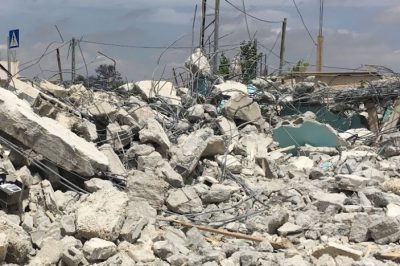“This House Was My Life, but I Saw It Smashed into Rubble Because I Am Palestinian”

Ghaleb Abu Hadwan, 63, and his family are staying with extended family back in Shufat refugee camp after Israeli forces last week destroyed the new home they had constructed in Wadi al-Hummus, after saving up for it for years.
“We are refugees from Yafa [Jaffa in Hebrew and English]”, Ghaleb told MAP, “and lived in Shufat. My three sons and I worked so hard as plumbers to save all our money to construct a big building for all the family.”
Then last Monday at around 2:30am, Israeli forces surrounded the Wadi al Hummus neighbourhood in the Sur Bahir area of Jerusalem governorate. They ordered the residents to evacuate their homes and declared the area a “Closed Military Zone”.
“I refused to leave”, Ghaleb said. “This house was my life, all our savings and hard work. How can they destroy my life? I tried to resist, but I lost consciousness. My brain refused to witness my house turning to rubble.”
Mohammed Abu Tair, a 43-year-old father of four, told MAP a similar story.
“I was almost finished with my nine-story building. I had invested over nine million Shekels in it. It took me years of hard work. In 2017, we received an order from the Israeli Supreme Court to stop all construction in Wadi al Hummus, until the Court examined the military decision to demolish all the houses in the area. But I still had hope that the decision of the Supreme Court would be fair and humane. We had every right to be optimistic. My building and many others were in an area which is under the responsibility of the Palestinian Authority and had been granted the required building permits. There was no legal basis for them to be demolished by the Israelis”
“How can I let all the years of hard work be destroyed in few minutes? I did not know what to do,” continued Mohammed.
“I decided to lie down on the floor of my building. I told the soldiers that I refused to leave. There were several Israeli and international solidarity supporters present, but the Israeli soldiers hit them and forced them to leave. I was left alone. I did not move. At 5 am, four Israeli soldiers attacked me by kicking and punching me. They said it was illegal to disturb the work of the soldiers, and I was arrested. My arm and leg were slightly injured. But I could not care less. I lost everything. They released me from the interrogation centre at 8pm, to find my building turned to debris.”
What happened in Wadi al Hummus was the biggest demolition since 1967. Ahead of the demolition, OCHA warned
“Seventeen Palestinians, including nine Palestine refugees, face the risk of displacement, and over 350 others risk massive property loss, due to the Israeli authorities’ intention to demolish 10 buildings, including around 70 apartments, due to their proximity to the West Bank Barrier.”
The demolitions drew immediate protest:
The UK government strongly condemned the demolitions in a joint statement with France, Germany and Spain, stressing:
“In this specific case, the demolitions were particularly egregious as a number of the buildings were located in Areas A and B, under the jurisdiction of the Palestinian Authority.”
Meanwhile Saleh Higazi, head of Amnesty International’s Jerusalem Office, said:
“These demolitions are a flagrant violation of international law and part of a systematic pattern by the Israeli authorities’ to forcibly displace Palestinians in the occupied territories; such actions amount to war crimes.”
As highlighted by the United Nations Office for the Coordination of Humanitarian Affairs, demolitions and forced evictions are some of the multiple pressures generating a risk of forcible transfer for many Palestinians in the West Bank. Residents of East Jerusalem and adjacent areas have been particularly affected, with a significant rise in demolitions there in 2019. Demolitions are grave violations of international law, have a devastating impact on Palestinians’ psychological well-being, especially for children, and are part of a systematic pattern of collective punishment.
Displaced again and back in Shufat refugee camp, Ghaleb said:
“My youngest grandchildren who were evacuated from their home are having trouble sleeping. They wake up screaming. I also wake up from nightmares. How can I not have nightmares? I saw my house turning into broken bricks for no reason but being a Palestinian under the Israeli occupation.”
*
Note to readers: please click the share buttons above or below. Forward this article to your email lists. Crosspost on your blog site, internet forums. etc.
Featured image is from MAP

